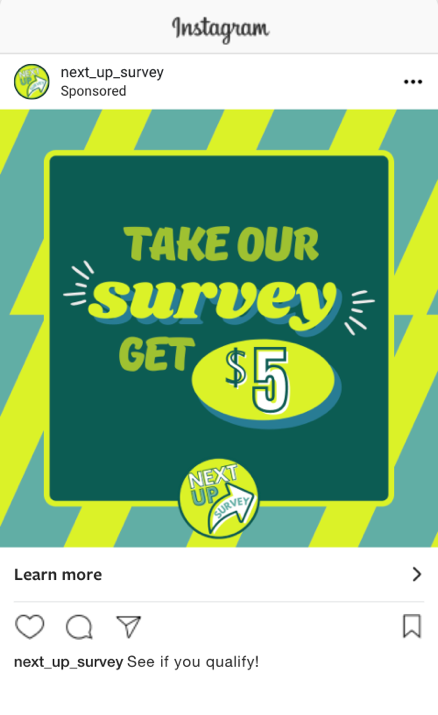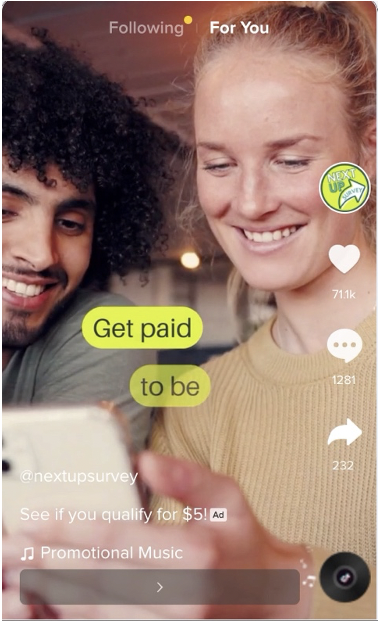Attachment C_Hookah_Beliefs_Recruitment_Ads_FAQ 22323
Generic Clearance for the Collection of Quantitative Data on Tobacco Products and Communications
Attachment C_Hookah_Beliefs_Recruitment_Ads_FAQ 22323
OMB: 0910-0810
Study Name: Increasing Understanding of Digital Advertising: Hookah Beliefs Survey
RTI Principal Investigator: Matthew Farrelly
OMB No. 0910-0810
Exp. Date 12/31/2024
RTI IRB No. 22093
Attachment C: Responding to Comments for Social Media Recruitment
Responses to Social Media Comments for the Increasing Understanding of Digital Advertising: Hookah Beliefs Survey
Overview
Social media recruitment for this data collection uses the social media platforms Facebook and Instagram. As potential participants scroll or tap through their personal feeds on these platforms, advertisements they may be interested in (determined by the targeting features set on the back end, which are age 18-24 and location within the United States) will appear. These ads are distinguished from organic social media posts with the use of the word “sponsored” or “ad,” which indicates that the content is a paid advertisement, underneath the account name (circled in red on ads below).
When a potential participant sees an ad and they decide to take an action, they have the following options: (1) click on or swipe up on the ad (and be directed to the survey screener), (2) like the ad (see the heart icon in the image below), (3) share the ad with friends (paper airplane or arrow icon shown below), and/or (4) comment on the ad (message bubble icon shown below).
Below are examples of how ads are displayed on Facebook and Instagram:






Because
these are inherently social platforms, the performance of these ads
is determined by a variety of engagement factors, which include:
Likes
Shares
Comments
Feedback (positive or negative)
Positive feedback is determined by clicks and successful conversions (e.g., screening in as an eligible participant to complete the survey).
Negative feedback is determined by how many people choose to hide the ad or provide negative comments.
If engagement factors are low and/or negative feedback is higher than positive feedback, these platforms will stop showing the ads as frequently and ad costs will rise. Historically, for recruitment ads like the ones proposed for this study, potential participants will often comment to ask questions and express grievance about the legitimacy of the survey. They may also question the process for receiving incentives and qualification requirements. If these comments and concerns are left untouched, it can hamper ad performance. However, participants will also comment to tag their friends and let them know about the survey. This doesn’t require a response but is a typical comment that often occurs.
Therefore, in order to: (1) keep engagement scores high, (2) provide participants with clear information about the survey, (3) maintain legitimacy, and (4) address negative feedback, the social media recruitment manager will respond to some of these comments by hitting “reply” on the particular comment. The social media recruitment manager is a member of the RTI team who is trained on how to respond to comments, based on the information in the “Action Plan for Social Media Comments” section below. Both the comments and responses will be public and can be viewed by anyone else who sees the ad, which allows the commenter and others to benefit from information provided about the survey.
Action Plan for Social Media Comments
Below are some examples of anticipated comments and our planned responses, based on evidence from similar sponsored ad content. Please note that any comments that reveal qualification requirements to screen into the survey as an eligible participant or have vulgar/inappropriate language will simply be deleted by the social media recruitment manager. Additionally, we provide responses to comments that aren’t related to the survey or the ad, but still warrant a response such as comments related to self-harm, depression, and suicide. We prepared these responses using with input from previous studies.
“Scam” “Fake” “Is this legit?”
We understand your concern but can assure you that this survey is legitimate and those who qualify to participate and complete the survey in full will receive their gift card. This study is sponsored by the U.S. Food and Drug Administration (FDA), in partnership with RTI International. To speak to the study coordinator at RTI about any additional questions related to the legitimacy of this study, please email [email protected]
“Just trying to steal our information”
Responses collected as a part of this study will be used solely for informing programs about youth tobacco use. Any information you provide will be kept private to the fullest extent allowable by law, and nothing you tell us will be reported with your name.
“I didn’t qualify” “Does anyone qualify?”
Thanks so much for taking the time to complete our eligibility screener. People do qualify to participate in this survey. Be on the lookout for more surveys in the future!
“I completed the survey and then was told I wasn’t qualified” (people who think the screener is the survey)
Thank you so much for taking the time to fill out our eligibility screener. Unfortunately, it looks like you didn’t qualify to take the full survey for the gift card but check back for more surveys from us in the future!
“I took it twice” “I took it multiple times”
Thank you for taking the time to participate in our survey! Please keep in mind that each qualified participant will only receive one gift card regardless of how many completed survey responses they submit.
“I didn’t get my incentive yet” “I never got paid”
As our thank you for participating in our survey, our team is dedicated to ensuring you hear back from us within 2 weeks. If it’s been over 2 weeks and you still haven’t received your gift card, please email us at [email protected] and we will respond promptly.
If a user indicates that they feel hopeless, helpless, and/or have suicidal thoughts or indicates harming themselves or a plan to harm themselves.
Response:
If you or someone you know has thoughts of self-harm or suicide, please get help. Call the National Suicide Prevention Lifeline at 800-273-TALK (8255) to reach a skilled, trained counselor at a crisis center in your area, anytime 24/7.
Or:
If you are [or someone you know is] experiencing thoughts of self-harm or suicide, please seek help now. Call 800-273-TALK (8255) to reach the free 24-hr Suicide Prevention Lifeline, click here [LINK: https://suicidepreventionlifeline.org/chat/] to chat with someone online, or call 911.
User indicates they or a friend are feeling depressed, sad, helpless, or having suicidal thoughts.
Response:
If you feel that you're in a crisis, whether or not you're thinking about hurting yourself, the National Suicide Prevention Lifeline can help. Call 800-273-TALK (8255) to reach a skilled, trained counselor anytime, 24/7. They can help with substance abuse, relationship and family problems, sexual orientation, money worries, recovering from abuse, depression, mental and physical illness, and even loneliness.
Or:
Depression is a common, but serious illness. It is important to get help if you're depressed. Get more info here: [LINK:http://www.nimh.nih.gov/health/topics/depression/index.shtml]. You can also call this number to talk to someone anytime, 24/7: 800-273-TALK (8255).
| File Type | application/vnd.openxmlformats-officedocument.wordprocessingml.document |
| Author | Pikowski, Jessica |
| File Modified | 0000-00-00 |
| File Created | 2023-08-27 |
© 2026 OMB.report | Privacy Policy